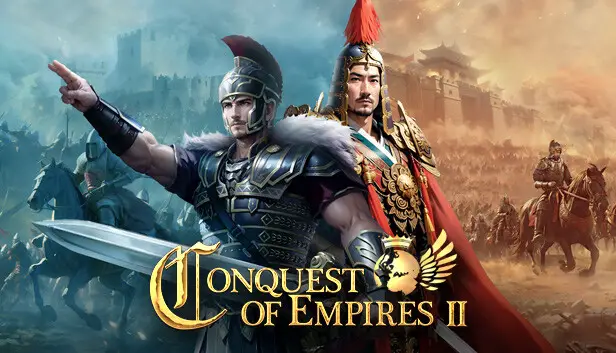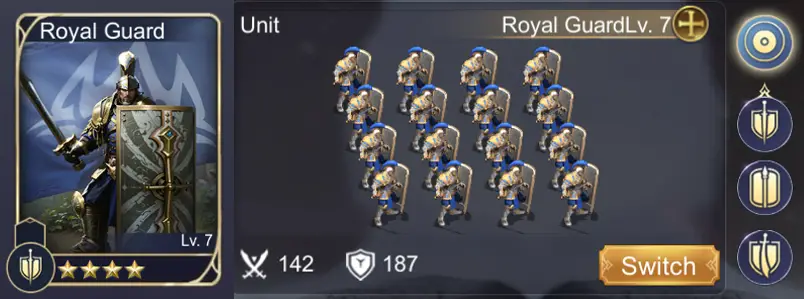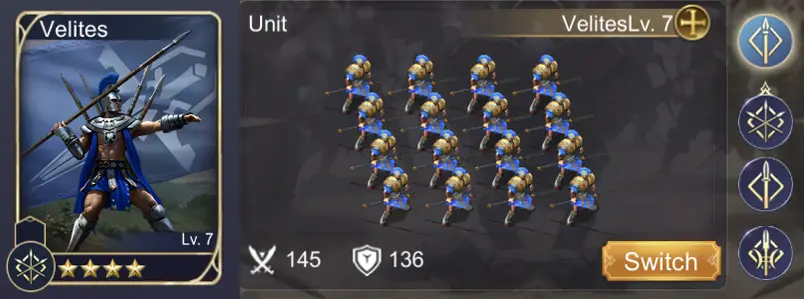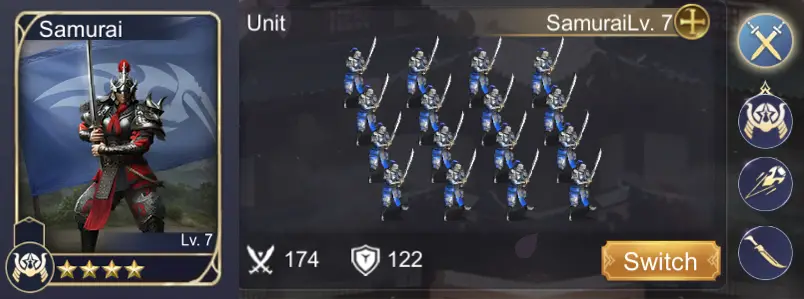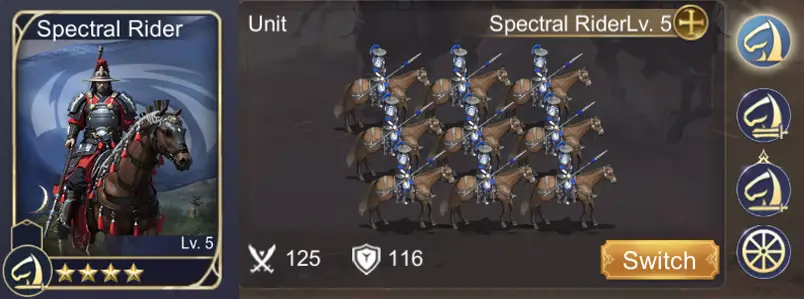This guide will be showing you the troop details as part of our Conquest of Empires 2 introductory guide.
Troops and Units
W grze, soldiers fall into three main categories: piechota, archery, and cavalry. Each category has various subdivisions. To unleash a hero’s full potential, assembling the right heroes and units in a specific formation is crucial. Let’s delve into the detailed classification of units.
Piechota
Infantry divides into three categories: Shielder, Pikinier, and Warrior.
Among these, infantry boasts the strongest siege capabilities but struggles with mobility compared to other unit types.
Distinguishing between these units is typically straightforward based on their distinct models and icons.
Shielders are easily recognizable by their shield symbols and warrior models holding shields. They excel in defense but typically have weaker offensive capabilities, often serving as the “zbiornik” in infantry squads. Many Shielders possess skills that reduce damage, and some can even block cavalry charges. Examples include Turtle Shell Troops, Blade Shielder, Slave Soldiers, Legion Soldier, Royal Guard, Forest Warriors, Strażnik, Janissary, and Armored Soldier.
Notable heroes among Shielders feature figures like the Epic Hero Gilgamesh, the Naval Commander of the Joseon Dynasty Yi Sun-Sin, and the Divinely-appointed Monarch Solomon.
Pikemen, in contrast to Shielders, strike a balance between offense and defense, with their penetration and armor attributes typically showing minimal discrepancy. Modeled as warriors wielding lances, Pikemen generally possess increased damage against cavalry, making them effective against mounted units. Dodatkowo, most Pikemen have the ability to block cavalry charges and some also exhibit a degree of effectiveness against infantry.
Within the Pikeman category, there are two notable variations: Velites and Mercenary Pikemen. Velites specialize in initiating long-range attacks at the battle’s onset, while Mercenary Soldiers boast an additional bonus to siege value.
Prominent figures among Pikemen include the likes of Leonidas, the King of Sparta, the Mystic Queen Queen of Sheba, and Li Jing, the Marshal of the Tang Dynasty.
Warriors, boasting the highest Dodge and Attack attributes among infantry, typically possess the weakest defense. They often wield sword-shaped symbols in their models and icons. Warriors are renowned for their ability to inflict increased damage upon infantry units and commonly come equipped with the passive skill of See Through Stealth.
Among Warriors, there are several noteworthy variations:
- The Samurai can unleash three rounds of long-range attacks at the beginning of a battle.
- The Assassin maneuvers invisibly for up to 10 seconds at the start of a battle, dealing extra damage during the first round of attacks.
- The Berserker unleashes a round of devastating Giant Axe strikes at the battle’s onset.
- The Mercenary Swordsman augments infantry squads by providing additional siege value.
- Anubis possesses the unique ability to restore a percentage of wounded soldiers who have dealt damage.
Famous warriors include the Uncrowned Queen Margaret I, the Lion Hunter Assyrian Barnibal, and the Daimyo of the Sengoku Period Oda Nobunaga.
Łucznicy
Archers typically possess moderate siege and transportation values.
A notable variant among Archers is the Catapult, which boasts additional siege capabilities. Heroes such as Gloriana Elizabeth I, Sunseeker Charles V, Queen of Byzantium Theodora, and Holy City Protector Godfrey of Bouillon command this specialized unit. Ponadto, the catapult’s attack possesses a splash property, allowing it to damage up to three targets simultaneously.
All bowmen are equipped with ammunition, and in battles where their ammunition is depleted, they resort to melee attacks akin to infantry. Formations tailored for Bowmen offer an ammo bonus effect, making it advantageous to deploy Bowmen in such formations.
Unlike infantry, Bowmen heroes often possess both bowmen and crossbowmen units, offering flexibility to adapt to various formations and strategic needs.
Cavalry
Cavalry is divided into two main categories: light cavalry and heavy cavalry.
With the highest transportation value but the lowest siege value, cavalry is not ideally suited for city assaults due to its limited siege capabilities.
Lekka kawaleria, szczególnie dla nowicjuszy, can be challenging to distinguish from Heavy Cavalry, with Light Cavalry generally considered inferior at this stage. Jednakże, Light Cavalry possesses exceptional speed, boasting the fastest movement speed in the game at around 2.5. Despite this advantage, most Light Cavalry units tend to lag behind Heavy Cavalry in terms of both offense and defense.
One notable characteristic of Light Cavalry is their lack of armor, which is often reflected in their icons and models within the game. In terms of attack effectiveness, Light Cavalry typically excel against archers, with many possessing skills that enhance damage specifically against archer units. Zatem, when targeting formations consisting of infantry and bowmen, Light Cavalry proves to be more effective than Heavy Cavalry.
Dodatkowo, many Light Cavalry units possess skills that prioritize targeting bowmen, further emphasizing their effectiveness against such units.
Heroes associated with Light Cavalry include the Perfect Knight Saladin and the Patriot of the Song Dynasty Yue Fei.
Cavalry Archer stands out as a distinctive type of cavalry, with only a limited number of heroes possessing this unit in the early stages of the new server. There are four primary types of cavalry archers: Mongol Shooter, Cavalry Archer, Camel Shooter, and Chariot.
Identifiable by their icon depicting a horse with a bow and arrow, and modeled as cavalrymen wielding bows and arrows, Cavalry Archers typically exhibit relatively high attack but lower defense, resembling characteristics of light cavalry.
With the exception of the Chariot, which has a movement speed of 1.2, other cavalry units boast a movement speed of 1.6. Cavalry units generally employ excellent attack strategies, conducting most attacks while mounted. Szczególnie, infantry units, with a movement speed of 0.6, struggle to pursue Cavalry Archers effectively in late-stage battles due to their superior mobility.
Cavalry units are also equipped with ammunition, allowing them to switch to melee combat once their ammunition is depleted.
Obecnie, heroes with cavalry archers include Saladin, the Paragon Knight; Timur, the Imperial Conqueror; Fan Lihua, the Unusual Heroine of the Tang Dynasty; Yue Fei, the Patriot of the Song Dynasty; and Ramses II, the Pharaoh of Egypt. Ramses II is unique as a 3-star hero, being the sole hero in the game to possess infantry, archery, and cavalry archer units simultaneously.
In the current stage, Heavy Cavalry surpasses Light Cavalry in both quantity and effectiveness. Although slightly slower than Light Cavalry, Heavy Cavalry boasts the second-highest movement speed in the game, clocking in at 1.7 (excluding jungle elephant soldiers). With superior attack and defense capabilities compared to Light Cavalry, Heavy Cavalry typically dominates on the battlefield, making Light Cavalry an inadequate match in civil wars.
Distinguishing characteristics of Heavy Cavalry include the presence of armor on their horses, although there is no discernible difference in modeling. Heavy Cavalry units generally specialize in attacking infantry, leveraging their Charge skill to penetrate targets and deal 200% damage upon impact.
A unique variant of Heavy Cavalry is the Forest Mahout, characterized by an additional damage-reducing skill. Despite moving at a slower speed of 1.3, Forest Mahout units offer added resilience on the battlefield.
Heroes associated with Heavy Cavalry include the Model Monarch Louis IX, the King of Kings Ardashir I, and Juv.
To wszystko, co dzisiaj udostępniamy w tym celu Conquest of Empires 2 przewodnik. Ten przewodnik został pierwotnie stworzony i napisany przez 515462739. Na wypadek, gdybyśmy nie zaktualizowali tego przewodnika, możesz znaleźć najnowszą aktualizację, postępując zgodnie z tym połączyć.
